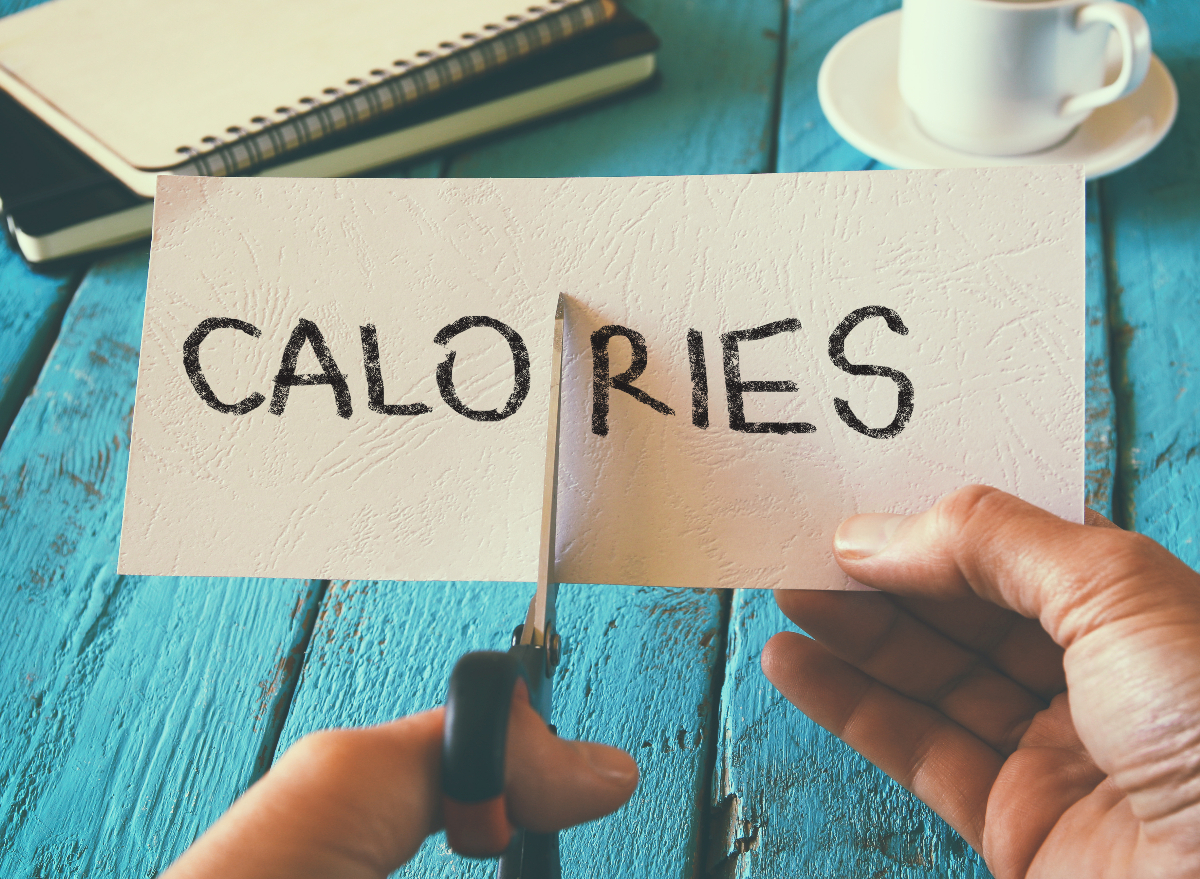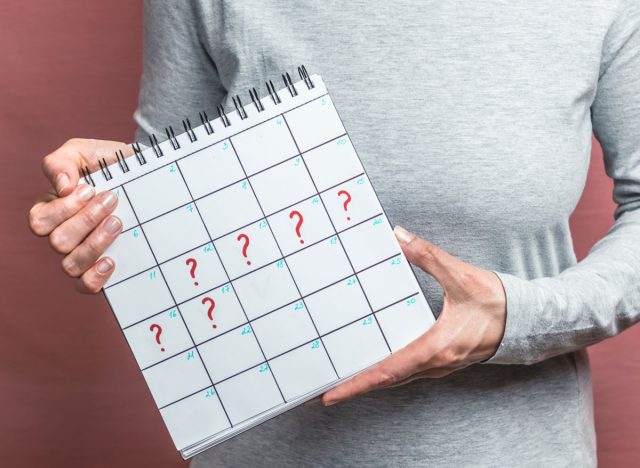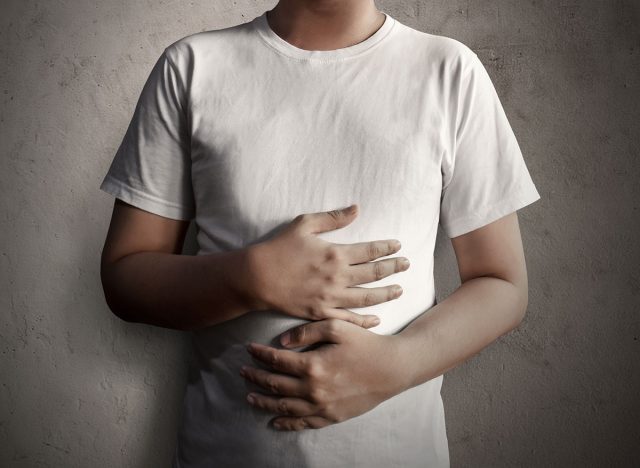What Happens to Your Body When You Start Cutting Calories

Now that the new year is in full swing, you are probably getting bombarded with messages about which diet you should be on. How do you know if you are cutting calories wisely? Even more so, what can you do if you’re struggling with the side effects of too much restriction? To get a better understanding of this, we spoke to key nutrition experts to find out exactly what happens to your body when you cut calories—especially when done too quickly and without proper strategy.
“Cutting calories drastically has a number of consequences in both short and long-term,” Alissa Palladino MS, RDN, LD, CPT, tells Eat This, Not That! “Short-term, cutting calories might result in nutrient deficiencies, increased hunger levels, decreased energy levels, impaired performance and recovery, and hormonal changes. Long-term, prolonged calorie restriction leads to metabolic compensation, in which the body adapts and burns fewer calories at rest for survival. This makes weight maintenance more challenging and weight regain more likely.”
Keep reading to find out what happens to your body when you drastically reduce your calorie intake. And for more dietitian-approved insight into the best self-care practices, check out 4 Signs It’s Time To Stop Dieting.
Constipation

Constipation is not often considered as a symptom of eating less, but severe food restriction significantly slows down the digestive tract. Over time, this can lead to chronic constipation as a result of extreme dieting.
Andrew Akhaphong, MS, RD, LD, a registered dietitian for Mackenthun’s Fine Foods, explains this phenomenon.
“Though a calorie deficit may help achieve weight loss, it may come with associated concerns related to decreased consumption of nutrient dense foods if calorie deficits are not done appropriately,” says Akhaphong. “Nutrient density is defined as the amount of nutrients compared to the calories provided by the food consumed.”
“One such example is the issue with chronic constipation,” he continues. “During calorie deficits, there may not be enough food volume, fiber, or even water content to support bowel movement and function. Chronic constipation can lead to severe pain, hemorrhoids, narrowing of the gut passage, and increase risk for colon cancer.”
Hormone disruptions

Hormones thrive in well-nourished bodies and their production requires significant energy, macronutrients, and micronutrients. A severe lack of any of these can potentially lead to hormone disruptions—and in women, loss of your menstrual cycle.
“Prolonged calorie restriction reduces sex hormone production, leading to changes in sexual drive and function and menstrual abnormalities in females,” explains Britt Richardson, RDN, CD, registered dietitian nutritionist and owner of A Full Bite Nutrition. “Missed or irregular periods may also be a sign of undernourishment.”
Nutrient deficiencies

This one might sound self-explanatory, but nutrient deficiencies can be serious if you continue long-term food restriction.
“Cutting calories can mean serious loss of nutrients if you’re not doing it right,” explains Sharon Puello, MA, RD, CDN, CDCES.
Puello also mentions that many folks may be overconsuming total calories, but this doesn’t necessarily mean that they are getting all the nutrients they need. In fact, research has shown that one may still be lacking in critical nutrients even after eating too much.
“Many people think [that if] they eat too much, they can’t possibly have a nutrient deficiency—but that isn’t so,” says Puello. “One study found those going in for bariatric surgery often have multiple vitamin or mineral deficiencies before surgery. If you are cutting calories, be sure to focus your attention on mostly removing sources of empty calories from the diet.”
“A common means of cutting calories is to restrict intake of dietary fats. However, this can lead to insufficient fat at meals, preventing you from absorbing beneficial vitamins,” advises Puello. “As a result, you can end up in a loop of trying to lose weight by restricting, then cutting back too much on necessary nutrients, leading to too few nutrients available to support your metabolism, hormones, and other components of your health, which facilitate a healthy weight.”
Hunger

We all know that feeling of skipping a meal and feeling excessively hungry later. As you reduce your calorie intake, growing hunger can become an inevitable reality—but why?
“Cutting calories too much can cause our stomachs to release more ghrelin, which is a hunger hormone,” says Kim Kulp, RDN, owner of the Gut Health Connection. “This increase in hunger can lead to headaches, nausea, fatigue, and difficulty concentrating.”
A steep calorie deficit without attention to eating foods that help manage hunger like protein, fiber, and dietary fat could result in higher levels of hunger that make it a lot harder to stick to the diet.
“If we restrict our intake without taking into consideration filling foods that contain adequate fiber, protein, and healthy fats then we end up still feeling hungry after eating,” says KeyVion Miller RDN, LDN, dietitian and culinary nutritionist. “This often leads to feeling frustrated.”
“Cutting calories responsibly isn’t usually a problem, if done in a balanced way with guidance from a nutrition expert,” adds Miller.
Lower energy

Calories are quite literally energy that our body uses for fuel. Thus, when you reduce your caloric intake, your energy levels inevitably drop, as well.
“Cutting calories may actually negatively impact your performance during the day. While we typically think about hunger as emptiness or growling in your stomach, hunger can also show up as difficulty concentrating or constantly thinking about food,”says Kayley Myers MS, RDN. “It is important to learn how your body responds to hunger and to act accordingly. If you cut your calories and start noticing a drop in energy levels or that it is taking you longer than usual to complete your tasks for the day, you may need to be eating more during the day.”
Intense cravings

In 1944, 36 men were studied for a year to discover the psychological effects of starvation. While this study is out of date by today’s standards, it taught us a lot about the human mind under starvation and is now considered a landmark study in nutrition. Ultimately, a study like this could never be conducted ethically today, so we look back on it to understand what happens to the human psyche during times of food scarcity.
The results were astounding at the time: the participants became obsessed with food, mealtimes, and even began craving foods they never would have previously. Further, when the study wrapped in 1945, many of the men described an insatiable urge to overeat.
This research stands now as a cautionary tale for calorie restriction: Extreme calorie restriction, also known as extreme dieting, has physical and mental health repercussions that last beyond just the time we spend in a calorie deficit.
Final takeaways

Calorie deficits can certainly be completed responsibly. However, you may want to take some precautions to make sure you are not going too strict, too fast.
Spend time monitoring for any adverse reactions you notice like constipation, hormone changes, extreme hunger, or food obsession to make sure you are on the right track. I also recommend working with a qualified dietitian to help you reach your goals when it comes to cutting calories. Finally, be cautious of charlatans who make promises that sound too good to be true.









